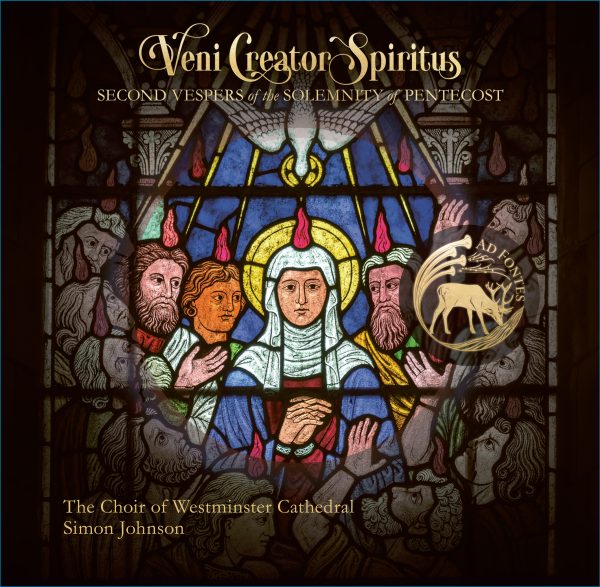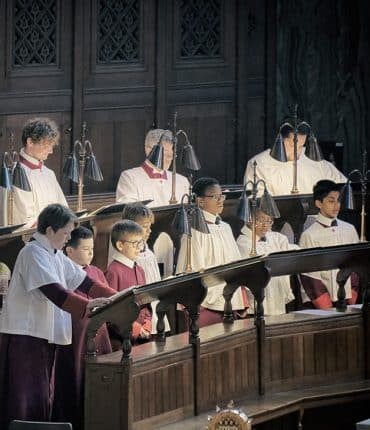
History of the Choir
Westminster Cathedral Choir owes its existence to Cardinal Herbert Vaughan, Archbishop of Westminster from 1892-1903.
Vaughan’s original intention was to establish a monastic foundation within his Cathedral, with the Office sung by monks in a continuous round of prayer. Conversations took place between Vaughan and both English and French monks, and the idea even reached Pope Leo XIII before doubts and uncertainties led to Vaughan calling a halt to the idea and plans for a Cathedral Choir began to take shape.
The standard of liturgical singing in the Catholic Church at the time was poor, and Vaughan knew that he had a unique opportunity to found a truly great choir. In 1899, he attended the opening of the Abbey Church in Ealing and heard the Choir of Downside Abbey under their Director of Music, Richard Terry. The Cardinal exclaimed: “This is the music I want for my cathedral.” Within two years, Terry had been appointed to Westminster to establish the choral foundation from scratch.
The new Cathedral Choir School welcomed its first boys in 1901. A year later, 25 boys and 16 men were ready to sing their first services in the Cathedral Hall (the Cathedral itself was not opened until the following year). The Choir’s workload was immense, with daily Mass and Vespers as well as high-profile events such as the Cathedral’s Consecration in 1910. A colourful character, Terry had a great enthusiasm for resurrecting the as-yet forgotten repertoire of 16th-century England; during his years at Downside, he spent his holidays at the British Museum preparing editions of music by composers such as Tallis, Byrd and Sheppard, and it was this music, as well as the Gregorian Chant, that formed the backbone of the repertoire in Westminster. In the words of Dom Gregory Murray, a monk of Downside who had been one Terry’s choristers at Westminster:
…he was an incomparable demonstrator, passionately convinced, and passionately intent on convincing others, that this forgotten polyphony was our greatest musical heritage from the past.
The Tablet, 1st May 1948
Following Terry’s departure from the Cathedral in 1924, a succession of priests was put in charge of the Cathedral’s music: Fr Vernon Russell, Fr Lancelot Long, and Fr William Bainbridge ran the Choir until the outbreak of World War II, ably assisted by the long-serving and devoted organist, William Hyde, who maintained sung services without the boys between 1939 and 1947. It was therefore twenty-three years after Terry’s departure that another legendary figure was appointed to Westminster Cathedral: George Malcolm.
Fascinated by the natural timbre of boys’ voices, George Malcolm recreated the sound of the Cathedral Choir in what has been described as a bright, ‘continental’ sound, with the boys once said to have had ‘voices like razors’. Passion and expression were paramount, both in his music-making and his dealings with others, and several iconic recordings provide a snapshot of his turbulent but inspired tenure. Benjamin Britten was so inspired when he heard the Westminster Choristers singing his Ceremony of Carols that he decided to write his Missa brevis in 1959, joining the likes of Vaughan Williams, Holst and Howells in writing new music for the Cathedral Choir.
Francis Cameron’s two years as Master of Music saw the first performance of the Missa brevis by Lennox Berkeley, and he was succeeded by Colin Mawby in 1961. An old chorister who frequently played the organ for services as a boy, Mawby steered the ship through the difficult years after the Second Vatican Council, composing prolifically for the Choir in both Latin and English. By the mid-1970s, the situation was precarious; financial pressures threatened the continued existence of the Choir School, and the changing liturgical practices of the time led the music of the Catholic Church to suffer something of a crisis of confidence.
Fortunes changed in 1976 when Basil Hume was appointed Archbishop of Westminster; he took the decision to save the Choir School by admitting day boys, no doubt inspired by the many happy years he spent at Ampleforth successively as schoolboy, monk, teacher and Abbot. A succession of outstanding Masters of Music has consolidated the Choir’s reputation. In 1979, Sir Stephen Cleobury was the first Anglican to be appointed Master of Music and his clear-thinking and methodical approach laid firm foundations for the future of the Cathedral’s music.
Westminster Cathedral Choir has continued to flourish under the leadership of David Hill, James O’Donnell, Martin Baker, and Simon Johnson, who have followed Sir Richard Terry’s example in encouraging composers to write new music for the Choir: Sir James MacMillan, Sir Peter Maxwell Davies, and Judith Bingham are among the composers who have written liturgical music for the Choir in the last few decades. The first 120 years of Westminster Cathedral Choir have seen it firmly established as one of the great choirs of the world; Cardinal Vaughan’s vision lives on.





